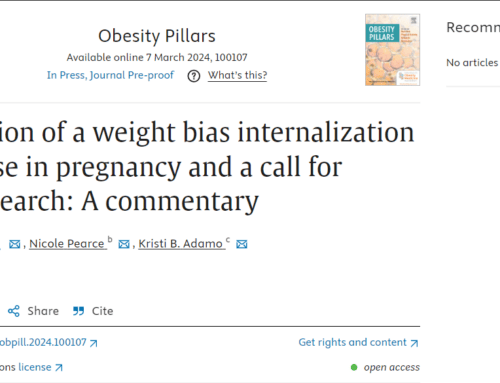May 14, 2018
Re: Web-based consultation for the WHO Independent High-Level Commission on NCDs
On behalf of the Canadian Obesity Network’s members and supporters, we thank WHO’s Director-General for convening this independent high-level commission on non-communicable diseases. We also appreciate the opportunity to provide feedback and input to the commission’s recommendations aimed at Heads of State and Governments in a pragmatic and policy friendly way.
Since the goal of this commission is to intensify political action to prevent premature death from non-communicable diseases, we respectfully ask that obesity be included in the list of NCDs that countries need to address.
Obesity has long been misunderstood, trivialized, and stigmatized as a simple “lifestyle” issue that can be effectively addressed by the mantra of “eat-less-move-more”. This simplistic view of obesity disregards both the lived experience of persons with obesity as well as the vast body of scientific evidence showing that, like other chronic diseases, obesity is a rather heterogeneous condition resulting from the complex interaction of a multitude of socio-psycho-biological factors that promote excessive weight gain and ultimately impair health. Most importantly, once established, powerful neuro-hormonal factors effectively defend our bodies against weight loss, thereby often making obesity a life-long problem, where weight regain (or relapse) is the rule rather than the exception.
Although it is well established that obesity is the primary driver of many chronic diseases such as cancer, heart disease and diabetes, obesity is also a chronic disease in itself.1-5 WHO has recognized obesity as a chronic disease for many years 6 and there is now significant evidence that obesity affects morbidity and mortality rates at the population level.7 The omission of obesity in the list of non-communicable diseases disregards the needs of millions of people living with obesity around the world. WHO can leverage existing chronic disease frameworks such as the “Health for All” policy framework8 and the “Global Plan of Action on Social Determinants of Health” 9 to recommend to Heads of State and Governments to address obesity in a comprehensive manner.
The lack of recognition of obesity as a chronic disease in the recommendations from this commission will have a significant impact on the type of policies that will be developed by Heads of State and Governments around the world. This is evident by the current lack of comprehensive action to prevent and manage obesity around the world. In Canada, specifically, the lack of recognition of obesity as a chronic disease by provincial and territorial governments has a significant impact for adults in Canada. Only a few provincial governments have focused their attention on health promotion among children and families and most have not implemented obesity treatment programs for Canadians living with obesity. The Canadian Obesity Network’s Report Card on Access to Obesity Treatment for Adults, 10 revealed that: 1) there is a profound lack of interdisciplinary teams for obesity prevention and management at the primary care level in Canada; 2) Anti-obesity medications are not covered by provincial public drug benefit programs or any of the Federal public drug benefit programs, and that 3) there are significant disparities in the access to bariatric surgery, with only 1 in 183 adults living with severe obesity having access to surgery every year. In many provinces and territories, wait times for bariatric surgery can go up to 5 years.
The lack of recognition of obesity as a chronic disease also has implications for private sector policies. The pervasive belief that obesity is a lifestyle risk factor has also stalled employers’ recognition that obesity is a chronic disease that affects the productivity and quality of life of their employees and deserving of medical treatment. Employers have invested in creating healthier workplaces by attempting to offer workplace gyms, weight-loss competitions, and encouragement of healthy eating. However, these initiatives, although well-intended and necessary for overall chronic disease prevention, rarely lead to long-term, sustainable weight management and are unlikely to meet the needs of people affected by obesity. Furthermore, many employees with obesity may avoid these wellness programs for fear of being shamed and blamed for their weight.
In addition to their condition being trivialized as a simple “lifestyle” problem, people living with obesity face widespread discrimination – on par with other forms of discrimination such as racism. 11-13 Moreover, obesity is the #1 reason for teasing and bullying in childhood. As with other forms of discrimination, research shows that the pervasive social stigma associated with obesity markedly affects peoples’ overall social and economic well-being and can significantly increase their morbidity and mortality.14
Of particular concern is the evidence showing that weight bias and discrimination disproportionately affects women with regards to opportunities in education, employment and healthcare.
Policy makers do not engage individuals with obesity in the development of policies and programs. The exclusion of patient lived experiences can also impact the effectiveness of these policies and programs.15 Many adults with obesity who experience shame and blame from public health policies or health professionals will avoid interactions with the health care system. This can cause delays in diagnosis of other serious medical conditions and prevents individuals from participating in health promotion programs. Shaming and blaming individuals for their weight will not change their health promoting behaviours, the opposite is in fact true. 16 Obesity stigma and discrimination can affect individuals’ life chances and significantly impact population health and social outcomes.17 Specifically, obesity stigma can lead to devalued social identity that increases vulnerability to loss of status, unfair treatment, discrimination, and health and social inequalities.18
To address obesity more effectively, we must shift the dialogue from blame and shame to evidence-based solutions as we do with other serious NCDs.
Recognition of obesity as a chronic disease by Heads of State and Governments will help to ensure more resources are dedicated to much needed research, prevention and treatment; that encouragement is given to healthcare professionals to recognize obesity treatment as a necessary and valued professional specialty; and that there is a reduction in the stigma and discrimination experienced by individuals living with this chronic disease.
We ask that obesity be included as one of the listed non-communicable diseases in the first report of the WHO Independent High-Level Commission on Non-Communicable Diseases and to recommend to Heads of State and Governments that they:
- Recognize obesity as a chronic disease and integrate obesity into Universal Health Coverage
- Reaffirm their commitment to reducing obesity in children, adolescents, and adults
- Prioritize policies that tackle the social and commercial determinants of obesity, including obesity stigma and weight-based discrimination.
On behalf of our 35,000 members and supporters, we would like to thank you for including these obesity recommendations in the first report of the WHO Independent High-Level Commission on Non-Communicable Diseases.
Arya M. Sharma, Scientific Director
Ximena Ramos Salas, Managing Director
Ian Patton, Patient Engagement Coordinator
Canadian Obesity Network-Réseau canadien en obésité






